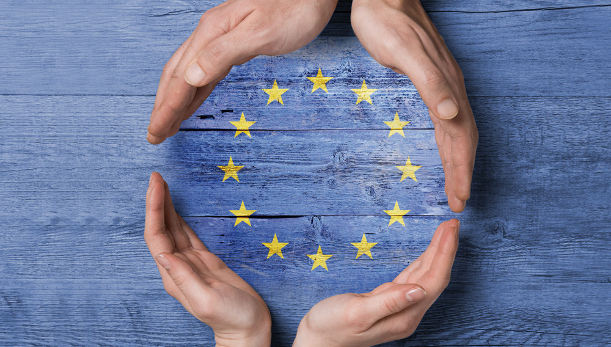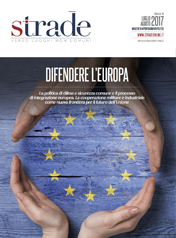Defending Europe
Luglio/agosto 2017 / Editoriale
Security issues are becoming, more and more clearly, 'existential' issues of identity. It is however possible to address them efficiently only by countering the process of renationalisation of European politics. Common defence – an idea that dates back to the early days of the construction of a European Community – is a driving force of the EU integration process. An ambitious challenge from a military, technological and industrial standpoint, and a possible ground for cooperation and debate with a United Kingdom that no longer knows how to get out of the Brexit trap.

Let’s start from where it started. The idea of a single European defence, as we know, has a long history, dating back to the project of the EDC, negotiated and then aborted in the early 1950s. The very authors of the Ventotene Manifesto had identified the United States of Europe as a project aiming to weaken, by means of a merger, the national military-industrial complexes, potentially able to rekindle nationalist hostilities which caused the tragic consequences of the conflicts that had devastated the old continent in the first half of the twentieth century.
Seventy years later, the issue of a single European defence is vehemently back, although for different reasons. National military-industrial interest groups are no longer seen as economic and political constituencies able to bring back war in Europe (while this seems unfortunately the more-or-less conscious goal of neo-nationalist and anti-European political groups), but rather as dysfunctional apparatuses, unable to provide European citizens with their value for money in terms of the “investment-to-security ratio”. Today, the single European defence can be a project that combines integration with functionality, the political and symbolic dimensions of the European integration process with efficiency, and politics with security policies.
It is a project that, if well presented, could benefit from a strong consensus among citizens who are uneasy about the fragility of national defence systems which are fragmented and likely more oriented towards competition rather than co-operation - while terrorist attacks can randomly hit Madrid, Brussels, Paris or any capital or region on the Continent. Moreover, the perception (probably still more psychological than actual at this stage) of Uncle Sam’s pulling out of conflict areas more closely affecting and undermining both Europe’s real and its perceived security, highlights the irrelevance and insufficiency, unless in a gregarious way, of the several European armed forces, even the best structured ones.
The American argument on the need to rebalance military spending on the two sides of the Atlantic offers an additional boost to reviewing the layout and effectiveness of the defence apparatus of the 28 – or 27 – EU members states. Mr. Trump simply reiterated in an antagonizing and inaccurate spirit – the style loved by those who hate a politically correct Europe and would rather have the incorrect one, no matter its shape or form – what previous Presidents had already requested, the latest being Mr. Obama – albeit in a cooperative spirit and with respect for other national and supranational institutions.
I believe that depicting the U.S. engagement for the defence of the old continent over the last decades as a sort of non-repaid investment is fundamentally flawed for many reasons, but certainly also because that investment was one of the drivers of the decades-long American supremacy, with its great and well-deserved economic benefits. However, I think the U.S. are right to demand an enhanced European empowerment on defence. As Mrs. Merkel said after the G7 Summit in Taormina, Europeans have to take their fate in their own hands. This is primarily true for security and defence, which can no longer appear to be - or actually be - delegated to allied countries. Especially so since NATO, for reasons largely independent from the political and institutional processes in the old continent, is called upon to face internal tensions and to reconsider the meaning of its geographic configuration and historical function, after the demise of the post-Yalta military bipolarity.
I don’t think, however, that the EU should take on an antagonistic or instrumentally provocative attitude towards the U.S., or reconsider the sense of its pro-Atlantic posture, which, far from being a mere military and strategic option, has political and cultural roots. I still find inspiring the words of Marco Pannella’s on the “United States of Europe and America” as an “expansive” projection of European federalism, which by the way already had a global perspective in the thinking of Altiero Spinelli, Ernesto Rossi and Eugenio Colorni, and which today can chart the course towards renewed unity and political cooperation of the West. A new military balance inside NATO can therefore be within reach for a European Union that moves closer to a single defence policy, in the interest of both sides of the Atlantic.
The conclusions of the European Council of June 22nd and 23rd are a very important step forward, at least, for the time being, as a statement of intents. The coming months will show if this was really a historic step, as affirmed by President Tusk. On the one hand, a European Defence Fund is set up to promote both research and military capabilities. Explicit reference is made to the need for industrial cooperation in the field of defence, with a focus on creating space for SMEs. On the other hand, the Council agreed on the need, within the framework of NATO and UN commitments, to engage in a Permanent Structured Cooperation (PESCO), as provided for by the Treaty of Lisbon but never activated before. Within three months, Member States will have to draw up commitments and criteria to ensure that Members wishing to participate in the co-operation can notify their intention to participate.
It is perhaps time to say that the “Europe that protects” mentioned by President Macron is taking shape. Security issues, which are not only perceived as matters of public safety, but as “existential” questions of identity by a public opinion prey to a sense of menace, can now help shaping a new European identity and a new political pact between European citizens and their institutions.
On paper, this project starts without the main military power of Europe, Great Britain, currently engaged in Brexit negotiations. Some even argue that London’s decision to leave the EU made it easier, and at the same time more compelling, to perform this quality leap towards a single defence which has yet to be conceived from a political, institutional and industrial point of view.
It might be true that Brexit was a positive boost for the cohesion of those remaining. Indeed, I believe it is so: one year after the referendum, Brexit has strengthened and not weakened the case for integration, and progress on defence is the most important sign, first of all in symbolic terms. However, it is clear also for those who, like me, considered the Brexit campaign an unforgivable mistake of an entire political class who did not understand or pretended not to understand what game they were playing, that we all would end up being weaker eventually.
“They” will be much weaker and less relevant, locked in their insularity and proud of retaking a control which is bound to become increasingly ephemeral, namely when the Pied Piper Farage’s slogans turn into the harsh reality of negotiations aimed at leaving the Union and the Single Market. But “we”, those who remain, will also become a little weaker, even though we reacted with pride and vigour, especially thanks to Macron’s victory - at least so far, while we wait for elections in Italy, where anti-European parties are strong and the pro-European front remains silent or is shy, and more inclined to blame the EU than to defend it.
London used to be effective in urging the completion of the single market and still is a relevant political-military force in the international arena, although much less than the nostalgic nationalists of across the Channel believe. That is among the reasons why I think that negotiations with London should be conducted in a rigorous way, with no laxity which could prevent Brussels from walking along the path towards an “ever closer Union”. But this is also among the reasons why I think that – thanks to this renewed impetus – we should leave the door open until the very end in case of a reassessment of its decision to leave by the United Kingdom. If democracy did not allow to democratically reverse the decisions that are found to have very different results than the ones initially sought, what kind of democracy would it be?
INDICE Luglio/agosto 2017
Editoriale
Monografica
- A United Europe for Defence? Increased safety and lower costs
- Quale difesa per quale Europa?
- Investing in security: the European Fund for Defence
- Le politiche spaziali, l’internazionalizzazione e l’integrazione dell’Ue
- Europa della difesa? Costa meno e ci rende più sicuri
- Investire in sicurezza: il fondo Ue per la difesa
- Common defence and security, the return of politics
- Defence as a currency, a European sovereignty
- Europe, time to unite forces
- Difesa e sicurezza comune, la rivincita della politica
- A possible EU army under current treaties
- La difesa come la moneta, una sovranità europea
- What defence for what Europe?
- Europa, è il momento di unire le forze
- Space policies, economic internationalization and EU integration
- Un esercito comune e comunitario. L’europeizzazione possibile a trattati vigenti









